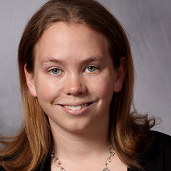Allison Bishop earns NSF CAREER award

Allison Bishop, an assistant professor within Columbia’s Computer Science Department and a member of the Data Science Institute, has been awarded a five-year $500,000 National Science Foundation (NSF) CAREER award to develop tools for designing and proving the security of new cryptographic systems. The CAREER award is the NSF’s most prestigious honor designed to support junior faculty who exemplify the role of teacher-scholars through their outstanding research and excellent teaching.
With the award, Bishop will build on her current research into provably secure cryptographic systems that can accommodate various levels of access to data, thus allowing different people to access different data within the same data source. The need for fine-grained control over data access has never been greater as vast amounts of sensitive data have to be simultaneously shared and protected, such as when a hospital needs to see almost all of a patient’s data but an insurance company needs to see only what procedures have been done.
Achieving more nuanced cryptographic capabilities means also enhancing the mathematical foundations that support such capabilities so that security at each access level can be enforced in a provable way. For this, Bishop is looking to integrate recent advances in lattice cryptography with her progress in designing security reductions. (In an interview done last year, she details some of this previous work.)
Bishop will also use the award to provide an entry point and training ground for emerging young scientists of all ages, giving advanced graduate classes a more integrated view of cryptographic system design principles, while opening valuable research opportunities to students at both the undergraduate and graduate levels. The educational outreach aspect extends to students of elementary-school age, for whom Bishop is producing a book that uses a fairy-tale setting to introduce mathematical reasoning. Motivating others will help ensure faster progress towards a flexible and more unified theory of cryptography to meet the mounting challenges of huge data sets, cloud computing, and other emerging data systems.

